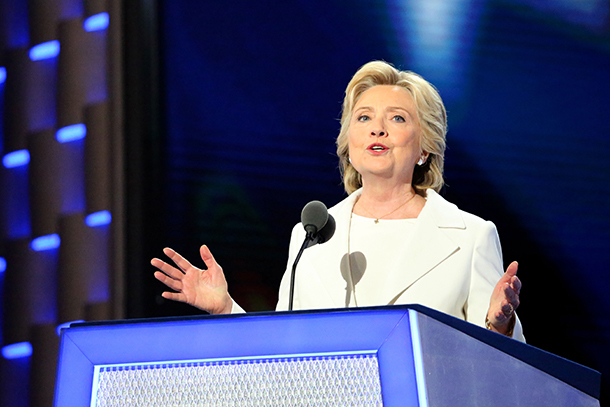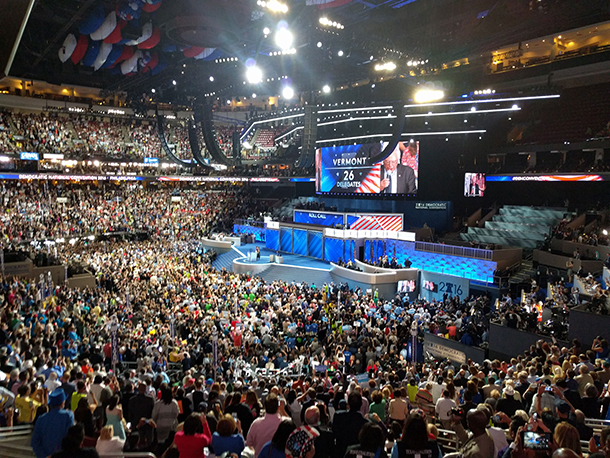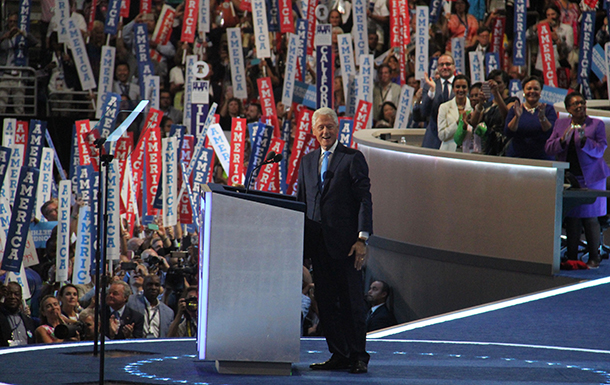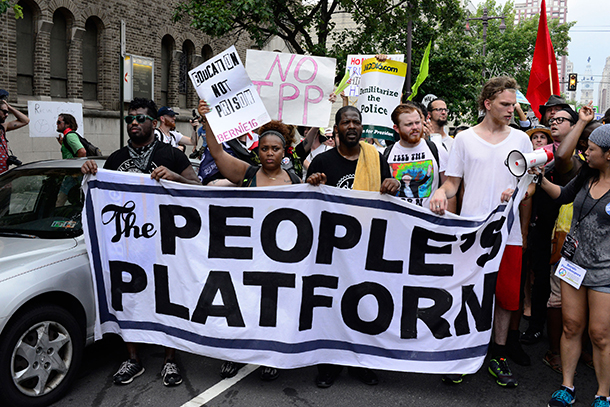Democratic Convention: Beyond the Headlines
Air Date: Week of July 29, 2016

Hillary Clinton gives her acceptance speech at the 2016 Democratic National Convention in Philadelphia, PA. (Photo: Ali Shaker/VOA, Wikimedia Commons)
Peter Dykstra discusses the Democratic National Convention that nominated Hillary Clinton and Tim Kaine with host Steve Curwood, and reflects on the party's environmental platform, as well as the speakers who addressed related issues at Philadelphia last week.
Transcript
CURWOOD: From the Jennifer and Ted Stanley studios at the University of Massachusetts Boston and PRI, this is Living on Earth. I’m Steve Curwood. We begin this week with Peter Dykstra and some analysis of the Democratic National Convention in Phildadelphia. Peter is with Environmental Health News, that’s ehn dot org and DailyClimate dot org, and joins us from Conyers, Georgia. Hey Peter, I imagine the history books will feature the first woman to be nominated for president by a major party.
But what about the precedents set for the environment?
DYKSTRA: Hi Steve. You know, with the Democrats, nearly every speaker I watched mentioned climate change and the environment. And though there were a lot of pro-coal signs on the GOP convention floor in Cleveland, the Republican speakers barely mentioned it.
CURWOOD: So what do you make of that?

Vermont Senator Bernie Sanders spoke at the Democratic National Convention on the first day of speeches. (Photo: JefParker, Wikimedia Commons)
DYKSTRA: Well, given how polarized the two parties are on the environment, to me it suggests that the Democrats see the environment as a campaign strength from coast to coast. The Republicans may only feature climate, and energy, and the environment in places where there are major controversies -- like the fate of coal in Appalachia, public lands and endangered species in many of the western states, oil and gas in oil and gas-producing states, and water rights in California’s Central Valley. Elsewhere the GOP just might not talk about it a whole lot.
CURWOOD: So, which Democratic speech really stood out on climate change?
DYKSTRA: Probably the one from Bernie Sanders. Don’t underestimate how much impact the Sanders campaign had on environmental issues, with strong pushback on things like fracking and the Trans Pacific Partnership trade deal.
CURWOOD: Well, the trade deal is one issue that Mr. Trump and Bernie are on the same side.
DYKSTRA: They are, but not entirely for the same reasons. But when Bernie Sanders spoke on the first night he delivered powerful words about “the need to leave this world in a way that is healthy and habitable for our kids and future generations.” It was part of a speech designed to heal the rifts between Clinton and Sanders supporters. Both Hillary Clinton and Tim Kaine, her running mate, have in the past shown support for the fossil fuel industry and for trade deals like the TPP, and that’s a major factor in the anti-Hillary sentiments voiced by some convention delegates.
CURWOOD: So, a lot of folks mentioned climate and environment. Who focused on it?
DYKSTRA: The Mayor of Flint Michigan, Karen Weaver, talked about the drinking water crisis in her city. The actress Sigourney Weaver introduced and narrated a compelling short film on climate change from director James Cameron. But the only scheduled speaker with specific environmental credentials was Gene Karpinski of the League of Conservation Voters. LCV has always described itself as a non-partisan group, but the partisan divide on the environment is so strong right now that not only have they endorsed Hillary Clinton, they did so eight months ago, before it was clear that either Clinton or Trump would be the nominees of their parties.

The amassed crowd at this year’s convention and former President Bill Clinton. (Photo: Disney/ABC Television, Flickr CC BY-NC-ND 2.0)
CURWOOD: What about Al Gore?
DYKSTRA: Al Gore announced that he would skip the convention, just like he did in 2012.
CURWOOD: So it looks like climate change got a bigger shout-out than at any previous convention, but the inconvenient truth is that Mr. Inconvenient Truth wasn’t there.
DYKSTRA: That’s right.
CURWOOD: Hey Peter, last week, we looked at the GOP’s environmental platform, so let’s take a run through the Democrats.
DYKSTRA: Sure. The Democratic platform calls for environmental constraints on trade deals like TPP, but it doesn’t oppose such deals outright, possibly thanks to Bernie Sanders, it backs away from the Obama Administration’s “all of the above” energy policy with goals and targets to pretty much phase out fossil fuels, get 50% of our electricity from clean energy in a decade, and cut out most greenhouse gas emissions by the year 2050. It also endorsed the call to investigate alleged corporate fraud by fossil fuel companies on climate change issues, and oppose any oil and gas drilling in the Atlantic or the Arctic.
CURWOOD: I can’t see many folks in the oil and gas industry signing on.
DYKSTRA: Right, but one bit of common ground between the Democrats and ExxonMobil -- they both want a carbon tax. Here are a few more intriguing new wrinkles from the Democratic Party: they want to decriminalize and regulate marijuana nationwide – and that might actually have a big environmental impact given the huge energy and environment footprint that illegal pot farms leave. In the wake of the tragedy in Flint, Michigan, the party uses strong language to condemn environmental racism in inner cities and on Indian lands, in farm communities and elsewhere. And the platform calls for removing all lead hazards, as part of a massive push for 21st century infrastructure involving energy efficiency, transportation, water systems, the electric grid and more.
CURWOOD: So obviously, the differences in the two party platforms are as huge as the differences in the candidates. Hey, what else did you pick up from the platform?

Thousands of Bernie Sanders supporters assembled outside the convention center to protest Democratic platform policy and in particular voice their objections to the Trans-Pacific Partnership. (Photo: Stephen Melkisethian, Flickr CC BY-NC-ND 2.0)
DYKSTRA: The thing that makes the Democratic platform remarkable is that the issues we cover on this show – energy, environment, climate change — aren’t just roped off into a block of a few pages, they’re present throughout the entire document. Environment is a component in goals on – and I’m going to give you a long list from the platform-- infrastructure, clean energy jobs, science and tech education, NASA, fixing the financial system and fixing the campaign finance system and corporate concentration, fair trade, racial gaps in income and opportunity, immigration, agriculture, Native Americans, public health, keeping a lid on nuclear, chemical and biological weapons, and illegal wildlife trafficking.
CURWOOD: Well, that’s a lot of talk, but is it just talk?
DYKSTRA: Well, whether it’s the Republicans’ platform or the Democrats’, it’s a wish list, just like the President’s State of the Union Address every year, or for that matter, when a contestant in one of Donald Trump’s beauty pageants tells us she wants to achieve world peace and end hunger. Either way – and whoever wins – it’s ultimately up to us to hold the parties accountable for what they promise us in their platforms and in their convention speeches.
CURWOOD: Peter Dykstra is with Environmental Health News, that’s ehn.org, and dailyclimate.org. Thanks so much Peter.
DYKSTRA: All right Steve. Thanks a lot.
CURWOOD: And there’s more on these stories on our website, loe.org.
Links
Hillary Rodham Clinton convention speech video
Bernie Sanders convention speech video
The Democratic Party’s primary election October 2015 climate change debate
Living on Earth wants to hear from you!
Living on Earth
62 Calef Highway, Suite 212
Lee, NH 03861
Telephone: 617-287-4121
E-mail: comments@loe.org
Newsletter [Click here]
Donate to Living on Earth!
Living on Earth is an independent media program and relies entirely on contributions from listeners and institutions supporting public service. Please donate now to preserve an independent environmental voice.
NewsletterLiving on Earth offers a weekly delivery of the show's rundown to your mailbox. Sign up for our newsletter today!
 Sailors For The Sea: Be the change you want to sea.
Sailors For The Sea: Be the change you want to sea.
 The Grantham Foundation for the Protection of the Environment: Committed to protecting and improving the health of the global environment.
The Grantham Foundation for the Protection of the Environment: Committed to protecting and improving the health of the global environment.
 Contribute to Living on Earth and receive, as our gift to you, an archival print of one of Mark Seth Lender's extraordinary wildlife photographs. Follow the link to see Mark's current collection of photographs.
Contribute to Living on Earth and receive, as our gift to you, an archival print of one of Mark Seth Lender's extraordinary wildlife photographs. Follow the link to see Mark's current collection of photographs.
 Buy a signed copy of Mark Seth Lender's book Smeagull the Seagull & support Living on Earth
Buy a signed copy of Mark Seth Lender's book Smeagull the Seagull & support Living on Earth

